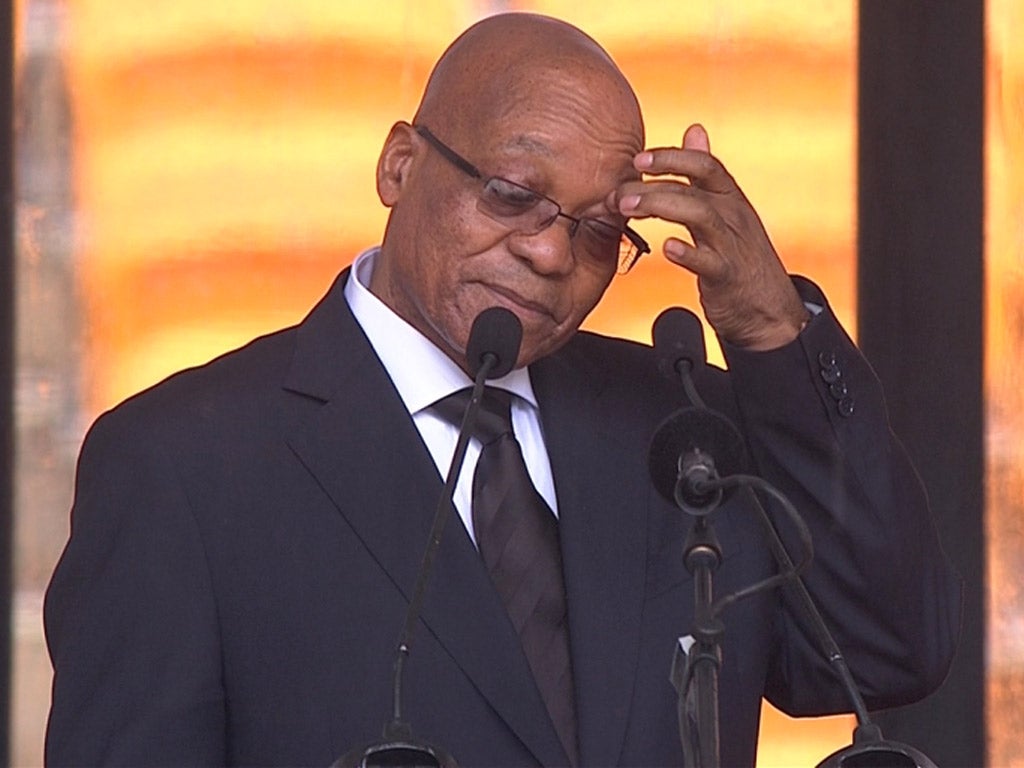Nelson Mandela memorial: The booing of Jacob Zuma shows that divisions still remain
In front of leaders from around the world, South Africa’s current President was derided as Nelson Mandela was honoured

Your support helps us to tell the story
From reproductive rights to climate change to Big Tech, The Independent is on the ground when the story is developing. Whether it's investigating the financials of Elon Musk's pro-Trump PAC or producing our latest documentary, 'The A Word', which shines a light on the American women fighting for reproductive rights, we know how important it is to parse out the facts from the messaging.
At such a critical moment in US history, we need reporters on the ground. Your donation allows us to keep sending journalists to speak to both sides of the story.
The Independent is trusted by Americans across the entire political spectrum. And unlike many other quality news outlets, we choose not to lock Americans out of our reporting and analysis with paywalls. We believe quality journalism should be available to everyone, paid for by those who can afford it.
Your support makes all the difference.Amid all the solemn reverence accompanying Nelson Mandela to his final resting place, South Africa and the world received a rude reminder of the divisions he left behind.
In front of dozens of international leaders, much of the crowd at a memorial ceremony in Soweto’s FNB Stadium booed South Africa’s current President, Jacob Zuma, and cheered Thabo Mbeki, the man he ousted first as leader of the African National Congress (ANC), then from the presidency.
The hostility that greeted the President’s image on the stadium’s giant screen might have been a shock, but perhaps it was not surprising. A man who in his time has faced charges of rape and corruption (he was acquitted of the first and the latter case was dropped), Mr Zuma never seems able to escape controversy for long. The latest scandal is over the expenditure of £1.2m of public funds on his lavish homestead in rural Zululand, allegedly for security improvements. An official report on the matter was due this week, but has been postponed.
Those who still see tribalism as a force in South Africa would point out that Mr Zuma was a long way from his Zulu heartland. Although the Zulus are South Africa’s largest ethnic group, that carries little weight in the ethnic melting pot of Soweto. Many residents still remember the savage attacks they suffered – before the 1994 freedom election – from Zulu migrant workers, traditionalists who were told that the ANC represented a threat to their tribal identity.
Even if that is all in the past, there is still plenty of cause for resentment in South Africa’s woefully uneven economic development. Democracy has created a new black middle class, but wealth remains overwhelmingly in the hands of whites. Unemployment stands at a third of the workforce, nearly all black, and official corruption is worsening.
But if that is more than enough reason to jeer Mr Zuma, why would the FNB crowd applaud Mr Mbeki? Mr Mbeki, Mr Mandela’s chilly, remote successor, has never been a man to inspire much affection. His wrong-headed refusal to distribute anti-retroviral drugs made millions of South Africans face a lingering death from Aids; his insecurity and inflexibility eventually alienated everyone in his party outside his immediate circle.
The crowd also showed its support for such divergent figures as the Nobel-winning Liberian President Ellen Johnson Sirleaf and Zimbabwean President Robert Mugabe. But the answer to the Zuma/Mbeki conundrum might lie in reports that there were cheers in the stadium for an even more unlikely figure: F W de Klerk, South Africa’s last white leader. He won the Nobel Peace Prize jointly with Mr Mandela, but fell out with the great man. That would indicate that the animosity towards Mr Zuma was not the result of divisions within the ANC, but between South Africa’s ruling establishment and the rest. If Mr Mbeki and Mr de Klerk have anything in common, it is that they sought what they thought was best for South Africa. Contrast that with an elite that is accused of having few policies beyond self-enrichment.
Until today, there had not been a single unpleasant incident anywhere in South Africa.
Whatever other conclusions can be drawn from the booing and cheering in the FNB Stadium where Mr Mandela made his last public appearance during the 2010 World Cup, even the poorest and least-educated in South Africa know that the leaders they have today do not come close to matching the greatness of the one they have lost.
Join our commenting forum
Join thought-provoking conversations, follow other Independent readers and see their replies
Comments